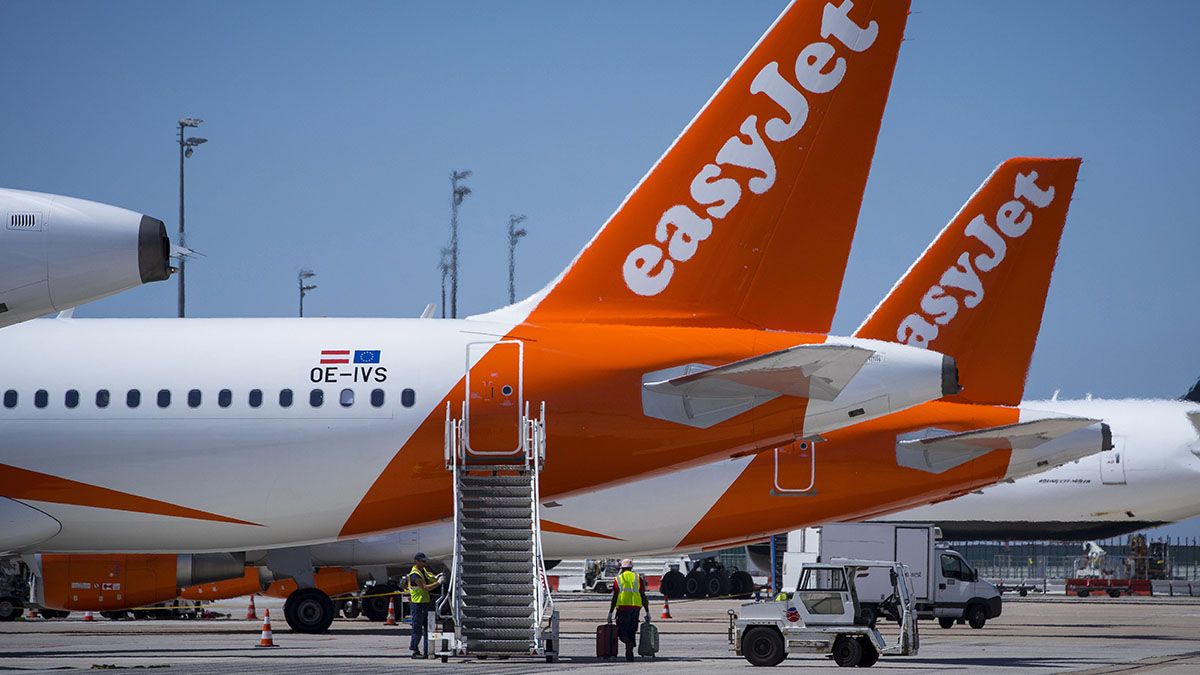
Out of the frying pan, into the fire. That’s the predicament that easyJet [EZJ] and other airlines find themselves in. Just as they were exiting a pandemic that grounded their planes and inflicted heavy financial losses, airlines must now contend with rising fuel prices and a cost of living crisis that has left many families wondering if they can afford a summer getaway.
Ahead of easyJet’s half-year results announcement on Thursday, we look at whether things could soon start to look up for the low-cost carrier.
EasyJet shares struggle to gain altitude
The travel sector’s turbulent journey over the past couple of years has been reflected in the easyJet share price, which nosedived by roughly 70% to below 400p amid the onset of the pandemic in 2020, before recovering to around 920p in May 2021.
However, in the second half of 2021 the shares trended downwards, sinking to a 52-week low of 417.40p during intraday trading on 7 March this year. The shares are now up at around 510p, equivalent to about 40% of their level in mid-February 2020.
Brighter skies ahead?
On 12 April, a trading statement for the six months to the end of March revealed that easyJet flights in March operated at 80% of 2019 capacity. That brought Q2 capacity to 67% of 2019 levels, putting the company on course to hit 90% of 2019 capacity in Q3, according to the statement. The announcement also stated that ticket sales for Q4 are close to 2019 levels.
Furthermore, the company has hedged 64% of its fuel costs for the second half of the year, reducing its exposure to the current high price of fuel, a situation which has been exacerbated by the fallout from Russia’s invasion of Ukraine.
While management are understandably keen to paint a positive picture of easyJet’s near-term prospects, the company is not out of the woods yet. The trading statement indicated that bosses expect a headline loss before tax of £535m to £565m for the half-year to 31 March, with half-year group revenue at about £1.5bn and headline costs of around £2.05bn.
Management said that they expect losses to come down in the six months to the end of September, as pent-up demand for air travel and the easing of Covid restrictions around Europe help to ramp up flight capacity over the crucial summer holiday period.
However, with headline inflation in the UK set to reach 10% or more this summer, eroding consumers’ disposable incomes, projections that air travel will bounce back to pre-Covid levels this year may need revisiting.
Coping with Covid-related staffing shortages
Earlier in May, easyJet said that it would remove seats from its A319 fleet to operate with fewer cabin crew as it seeks to prevent a repeat of this Easter’s travel chaos, when the budget airline cancelled hundreds of flights because staff were absent with Covid.
The aircraft refits will limit capacity to 150 passengers, enabling easyJet to fly the planes with three cabin crew instead of four. The airline is trying to hire new cabin crew to replace the staff it laid off during the pandemic, but staff shortages are expected to remain a problem for the next 12 months.
By now, easyJet’s shareholders are well acquainted with business uncertainty. Nevertheless, it must still be a source of frustration that, just as the pandemic moved into the rear-view mirror, fresh challenges, from surging fuel prices to a sharp drop in living standards, now threaten to scupper the travel industry’s recovery. Investors will be looking out for signs that demand for air travel is holding up in the face of these challenges, when easyJet announces its half-year results at 7am on Thursday 19 May.
Disclaimer: CMC Markets is an execution-only service provider. The material (whether or not it states any opinions) is for general information purposes only, and does not take into account your personal circumstances or objectives. Nothing in this material is (or should be considered to be) financial, investment or other advice on which reliance should be placed. No opinion given in the material constitutes a recommendation by CMC Markets or the author that any particular investment, security, transaction or investment strategy is suitable for any specific person. The material has not been prepared in accordance with legal requirements designed to promote the independence of investment research. Although we are not specifically prevented from dealing before providing this material, we do not seek to take advantage of the material prior to its dissemination.





















